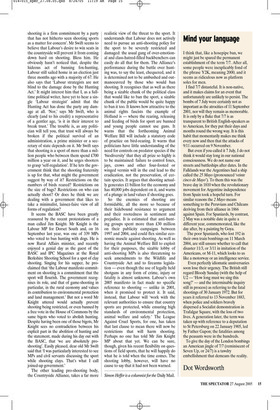Mind your language
I think that, like a hosepipe ban, we might just be spared the permanent establishment of the term 7/7. After all, some people were inexplicably fond of the phrase Y2K, meaning 2000, and it seems as ridiculous now as platform soles for men.
I find 7/7 distasteful. It is non-native, and it makes claims for an event that unfortunately are unlikely to persist. The bombs of 7 July were certainly not as important as the atrocities of 11 September 2001, nor will they remain as memorable. It is only by a fluke that 7/7 is as transparent to British English-speakers as to American, for they put their days and months round the wrong way. It is this habit that momentarily makes me think every now and then that the attacks of 9/11 occurred on 9 November.
But even if you called it 7 July, I do not think it would stay long in our national consciousness. We do not name our streets and battleships after dates. In the Falklands war the Argentines had a ship called the 25 Mayo (pronounced ‘veinte cinco de Mayo’). To them this was the brave day in 1810 when the revolutionary movement for Argentine independence from Spain took a hopeful turn. For similar reasons the 2 Mayo means something to the Peruvians and Chileans deriving from their alliance in 1866 against Spain. For Spaniards, by contrast, 2 May was a notable date in quite a different year, commemorated, like the day after, by a painting by Goya.
The poor Spaniards, who lost 192 in their own train bombings on 11 March 2004, are still unsure whether to call that disaster 11/3, or 3/11 in imitation of the Americans, or M-11, which looks to us like a motorway or an intelligence service.
Even perfectly idiomatic anniversaries soon lose their urgency. The British still regard Bloody Sunday (with the help of U2 — ‘How long must we sing this song?’ — and the interminable inquiry still in process) as referring to the fatal shootings of 30 January 1972. But for years it referred to 13 November 1883, when police and soldiers bravely dispersed a Socialist demonstration in Trafalgar Square, with the loss of two lives. A generation later, the term was taken up with reference to a deputation to St Petersburg on 22 January 1905, led by Father Gapon; the fatalities among the peasants were in the hundreds.
To give the day of the London bombings an American jingle of 7/7 (reminiscent of Seven Up, or 24/7) is a tawdry embellishment that demeans the reality.
Dot Wordsworth











































 Previous page
Previous page